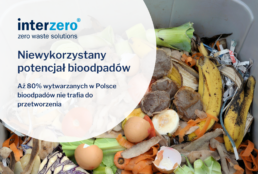Bio-waste was supposed to be a source of green fertiliser and clean energy, and its treatment was supposed to be a remedy for the increasing minimum recycling levels of municipal waste. However, reality has turned out to be far from expectations - the collection system for bio-waste is not fully effective and the potential of this fraction tends to go to waste in landfills.
Only 20% of all biowaste is separately collected
Currently in Poland and throughout the EU only a small percentage of the biowaste generated is treated. This applies to both industrial and municipal waste. In a report by Zero Waste and the Bio-based Industries Consortium (BIC) Bio-waste generation in the EU: Current capture levels and future potential it was estimated that each Pole can potentially generate 247 kg of bio-waste. This sum consists of:
- 112 kg of food waste,
- 135 kg of green waste.
The calculation of the theoretical potential was based on a set of public reports and national data.
However, the data made available by the CSO shows that Only 52 kg are collected separately bio waste. Why the difference? Most likely it is due to improper segregation of biowaste - instead of going into the organic fraction, they end up in mixed waste.
According to the calculations of the report's authors, in Poland only selective collection is carried out:
- 9% food waste,
- 20% all bio-waste (food waste + green waste).
In contrast, the average for EU countries is 24.9% for food waste and 30% for the entire bio waste fraction.
As the authors of the report conclude:
The implementation of food waste collection strategies and practices will be one of the main factors in increasing the overall recycling rate of biowaste in the near future.
Untapped potential of food and catering waste
The cited report by Zero Waste and the Bio-based Industries Consortium (BIC) indicates that as much as 75% of the food waste generated in the EU remains unused. This results in the loss of valuable resources that could be processed into natural fertiliser and alternative fuel, as well as excessive methane emissions that occur at landfill sites. To counter waste, Polish entrepreneurs operating in the catering and non-catering sectors are required to enter into a contract for the collection and management of the food waste they produce. They can either conclude this contract with the municipal company or with a specialised waste collection company such as Interzero.
Cooperation with Interzero for the collection of food waste from companies and institutions is a guarantee for its proper management. The waste we collect catering waste is sent to specialised processing facilities - composting and biogas plants, where they undergo composting and fermentation processes. Professional collection of food waste is one of the best ways to make the idea of a closed loop economy a reality and to avoid the legal consequences that incorrect bio-waste management entails.
Industrial composters for food and catering waste
Manufactured in companies food waste can also be managed at sourceon site. To this end, Interzero offers a range of electric composters for industrial use. They make it possible to reduce the volume of waste by up to 90% and turn it into an excellent, nutrient-rich substrate (pre-compost) that can be used as a soil improver, biomass fuel or raw material for anaerobic digestion. The whole the process takes only 24 hours and is odour-free thanks to a deodorisation system.
Oklin's range of composters also includes a unit for home use. Oklin GG-02 compact electric composter can be set up in the kitchen or pantry, providing a more convenient and quicker alternative to composting kitchen waste in a traditional composter.
Sealing the collection of municipal biowaste as an opportunity to meet demanding recycling targets
Household-generated bio-waste that is not managed at source has to be separately collected and then collected by municipalities. However, the collection systems currently in place are not perfect. In order to make it easier for municipalities to carry out the tasks of effective collection and subsequent management of bio-waste, the EIA-PIB has developed a Catalogue of good practice in the collection of biowaste, which presents examples of efficient biodegradable waste management systems in Poland and Europe.
According to a report by the European Environment Agency, bio-waste accounts for approx. 34% of the total municipal waste stream produced within the European Union. In Poland, this percentage was 37.4% in 2023. Given that already from 2025, municipalities will have to reach the 55% municipal waste recycling rate required by EU regulations, emphasis will have to be placed on the recycling of biowaste as the most abundant fraction. Is it possible? We talked about the pains and challenges of bio-waste management with Jan Kolbusz, Chief Technologist and President of Microbiotech in the Eko Bez Kantów podcast Clean energy and fertile soil. How to unlock the potential of biowaste?
Sources:
- https://biconsortium.eu/publication/bio-waste-generation-eu-current-capture-levels-and-future-potential-0
- https://stat.gov.pl/obszary-tematyczne/srodowisko-energia/srodowisko/ochrona-srodowiska-2024,1,25.html
- https://magazynbiomasa.pl/bioodpady-komunalne-jaki-to-potencjal-sprawdz-koniecznie/
